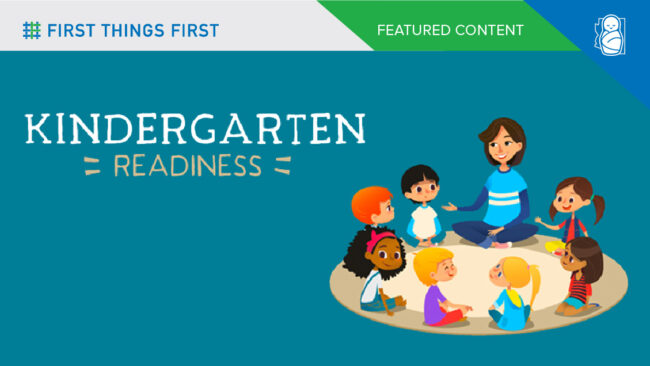Starting kindergarten is a huge milestone—not just for your child, but for you, too. You might be wondering, “Is my child ready?” From mastering routines to making friends and learning how to listen, a lot is happening during this big transition.
The good news? You don’t have to figure it all out on your own. Whether your child is just turning 3 or closer to 5, you can help them build the skills they’ll need to succeed in school—and enjoy the journey along the way.
What is Kindergarten Readiness
Kindergarten readiness is about more than ABCs and 123s. Sure, academics matter—but so do social skills, self-care and emotional development. Here’s what being “ready” really looks like:
- Social-Emotional Skills: Your child can share, take turns, manage their feelings (most of the time) and enjoy playing with other kids.
- Physical Skills: They can use a pencil or crayon, cut with scissors and go to the bathroom on their own. (These are called fine motor skills.)
- Language Skills: They can follow directions, listen to a story and talk about what they see or feel.
- Curiosity + Focus: They ask questions, try new things and stick with a task—even if it’s tricky.
- Basic Knowledge: Recognizing a few letters, colors, numbers or their name is helpful—but not required!
In Arizona, kindergarten isn’t mandatory until age 6, but children can start the school year if they turn 5 before September 1. Many schools start registration in January, so check with your local district for deadlines and events.
Simple Ways to Get Ready—Starting Now
Even if your child’s first day is months (or years) away, everyday moments can prepare them for the classroom. Try these easy activities:
Read Together Every Day
Set aside 20 minutes a day to read with your child. Pick books with colors, counting, or topics they love. Ask open-ended questions like, “What do you think happens next?” or “Why do you think they’re sad?”
Talk Throughout the Day
Whether you’re in the car or at the grocery store, talk with your child about what you’re doing and what you see. You’re building vocabulary and helping them learn how to communicate.
Encourage Writing + Drawing
Let them scribble, color and explore with crayons or markers. Ask things like, “Tell me about your picture.” Even if it’s just lines, they’re learning to express themselves and strengthen the small muscles needed for writing.
Practice Self-Care Skills
Teach your child to use the bathroom, wash their hands, blow their nose and sneeze into their elbow. Let them practice asking for help, too—it builds independence and confidence.
Talk About What to Expect
Before school starts, chat often about what their day might look like. Who will drop them off, what lunch will be like and how pickup works. Familiarity helps reduce anxiety.
Get Into a Routine Early
Practice your morning schedule a few weeks ahead:
- Pick out clothes the night before
- Eat a healthy breakfast
- Walk to the bus stop or drive by the school
- Open lunch containers together at home to practice
Still Not Sure If They’re Ready
That’s okay. Readiness looks different for every child. The most important thing is to give your child plenty of opportunities to play, ask questions, and feel supported. Whether they’re curious, cautious or a mix of both—you’re helping them build a foundation that will serve them in kindergarten and beyond.


